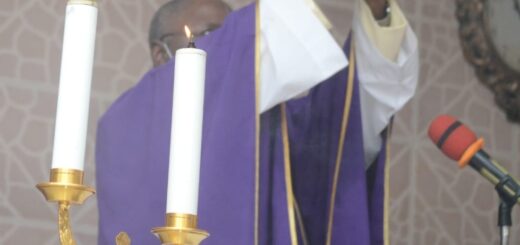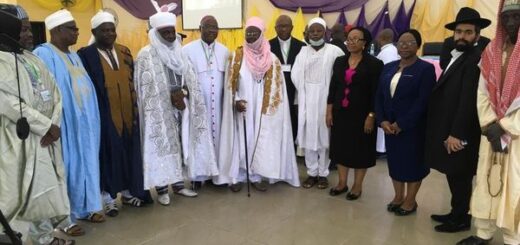GIVE THANKS TO THE LORD FOR HIS GREAT LOVE IS WITHOUT END
by ARCH BISHOP · July 27, 2025
SILVER JUBILEE OF THE PRIESTLY ORDINATION OF MOST REV. ERNEST OBODO AND HIS ORDINATION MATES, AT ST. MARY’S CATHOLIC CHURCH, UDI, ENUGU STATE. HOMILY BY MOST REV. IGNATIUS A. KAIGAMA, ARCHBISHOP OF ABUJA, 26th JULY, 2025.
READINGS: ISAIAH 61:1-4; 1THESSALONIANS 1:3-7a; MATTHEW 20:25b-28
THEME: GIVE THANKS TO THE LORD FOR HIS GREAT LOVE IS WITHOUT END
My brother, Bishop Callistus Onaga, the Bishop of Enugu Diocese and the proprietor of Godfrey Okoye University, where I serve now as Chancellor by virtue of his appointing me, Bishop Ernest Obodo, the Auxiliary Bishop of Enugu and the Silver Jubilee celebrant together with the other nine priests ordained together in 2000, dear brothers in the episcopate and in the priesthood, the Religious, government dignitaries, led by His Excellency Dr. Peter Ndubuisi Mbah, Governor of Enugu State, and our wonderful lay men, women, youths and children who make up over 99% of our Catholic Church. Peace be with you.
I see my invitation to preach at this priestly Silver Jubilee Mass as a very important further step in strengthening the relationship between the Catholic Church in the East and the Church of Northern Nigeria. Such efforts have been ongoing in different ways. When I was appointed a Bishop in Jalingo, I deliberately asked Bishop Gregory Ochiaga, then Bishop of Orlu, to be one of my co-consecrators. When the then Msgr Peter Opaleke (now Cardinal) was ordained as a Bishop, I was chosen to be one of the co-consecrators. At the ordination of Bishop Denis Isizoh, I had the privilege of preaching the homily. I have come all the way to preach here today not because I have anything special to say, but to hopefully remind us to continue our individual and collective labour of love for the Lord and for His people in these difficult times, bound together in Christ in whom we are a new creation (cf. Gal 6:15). Perhaps my presence here will also hopefully remind you of the need for more solidarity of the Catholic Church in Eastern Nigeria with the Church in Northern Nigeria in view of the present socio-cultural and religious circumstances in the North. It was Late Archbishop Albert Obiefuna who said that the water of baptism should be thicker than that of blood relationship.
We gather today with hearts full of gratitude and joy as we celebrate the Silver Jubilee of the priestly ordination of Bishop Ernest Obodo and his class of ordination.
Twenty-five years ago, they answered the Lord’s call, to serve the Church as shepherds of God’s people. Today, we give thanks to God for the gift of their vocation, for their perseverance in ministry, and for the grace that has sustained them through joys and trials alike.
Owolabi Salis, a US-based lawyer and politician is said to be the first Nigerian citizen to travel to space recently. Impressed and overwhelmed by what he saw as the work of creation, he said that it makes no sense for anybody not to worship the Almighty Lord of the universe. One can equally say it makes no sense for anyone not to thank God always. “What do you have that you didn’t receive? If, in fact, you did receive it, why do you boast as if you hadn’t received it?” (1Cor 4:7). Always rejoice in the Lord. Ps 150 invites us especially to use trumpet, harp, stringed instruments and organs, cymbals, to praise Him. He is such a loving, kind and merciful God; and he is what the theologian Rudolf Otto popularized in the Latin phrase “mysterium tremendum et fascinans” which refers to God’s awe-inspiring and fascinating mystery.
Each of the priests has spent a total of 25 years in service. There are ten of them. That brings the total to 250 priestly years of service. Praise the lord!
The first reading from Prophet Isaiah beautifully expresses the identity and mission of the priest: anointed and sent. The priest is not a self-made man. As Archbishop Fulton Sheen would say, “The Priest is Not His Own.” He is one who has been chosen, consecrated, and empowered by the Spirit to proclaim good news, bind broken hearts, set captives free, and comfort the afflicted. I am quite sure that over the past 25 years, Bishop Obodo and his ordination mates have lived out this mission with dedication in various ways. Through preaching, celebration of the sacraments, pastoral care, formation of the young, administrative duties, etc., they have been visible signs of Christ’s compassionate presence. In a world that often wounds and divides, their priesthood has been a source of healing and unity.This is evident in their lives of service and sacrifice.
St. Paul’s words to the Thessalonians capture the essence of what we celebrate today: lives of faith, labor of love, and endurance inspired by hope in Christ. These are not just virtues; they are fruits borne out of years of daily commitment, silent sacrifices, and untold moments of prayer and service.
The journey of 25 years has not been without its valleys – moments of loneliness, misunderstanding, or discouragement. If they were each asked to share their experiences, I am sure they all have their fair share of challenges and down moments, but through it all, they remained faithful. This makes the statement true “God calls us to be faithful and not necessarily to be successful.”
Dear jubilarians, you have become models to the flock, just as Paul noted: “You became an example to all the believers;”
your constancy and service have been a silent homily to the people you have served and continue to serve. You have preached not just with words but with your lives. May your endurance continue to inspire younger priests and seminarians who look up to you.
In the Gospel, Jesus reminds us of the true character of Christian leadership. “Whoever would be great among you must be your servant…” (Matthew 20:26). It is not about titles, honors, or positions – it is about service, and sometimes, sacrificial service. The priesthood is a paradox: the one who leads must serve; the one who teaches must learn from the people; the one who presides at the altar must also walk with the poor. It is both a privilege as well as a great responsibility. And to whom much is given, much more is expected.
For twenty-five years you have enjoyed God’s grace, thus, you have a lot to be grateful for. You have been truly honoured, and we join you in thanking God for a such great privilege. You have served well, and the Church is proud of you.
Apart from his pastoral and spiritual solicitude, Bishop Obodo is engaged in agricultural ventures, achieving great results. Instead of many Nigerians believing that wealth is only to be found in the oil business or in holding high political offices, Bishop Obodo teaches by his concrete agricultural ventures that
agriculture could be the saving grace for this nation. The land is there, vast and fertile, except for the lack of mechanization of our farming methods and recently, the menacing activities of militant herdsmen and kidnappers. We should suffer no want of food or the kind of poverty experienced by many today considering the enormous wealth hidden inside our land.
I am happy that Bishop Obodo is championing the Enugu Diocesan assault against hunger and poverty by venturing into agriculture. Every priest does what God has inspired him to do. Fr. Christian Anieke has given himself with unusual zeal and dedication to the development and growth of GOU, while other priests have excelled in their areas of pastoral, spiritual, and administrative assignments with equal dedication and passion.
Dear brother priests, You are still fighting the good fight. The journey is not over yet. Silver Jubilee is not a finish line nor a time to relax. Rather, it is a milestone, an opportunity to look back with gratitude and forward with a renewed purpose to continue to serve God and humanity for as long as God gives you life and strength. Ahead, lies the call to deeper trust, greater service, and even more radical love.
Note however that Archbishop Fulton Sheen said: “The fall of the priest is completed by these steps: neglect of prayer, withdrawal to a distance from the Eucharistic Lord, dedication to a comfortable existence, negligence concerning occasions of sin and, finally, the substitution of a creature for the Christ.” At this stage of your lives and priesthood, you are called to be drawn much closer to and intimate with the Lord, for Christ Himself has said it, “Cut of from me, you can do nothing.”
To the rest of us, as we honor these priests today, let us also commit ourselves to support their mission. The priest needs not only our applause but our prayers, understanding, and collaboration. Do not look for faults or opportunities to bring them down, instead, encourage them and pray for them.
Priests are not superhuman; they are fragile, human too with emotions, challenges, and vulnerabilities, just like everyone else . Hb 5:2 says they themselves are also encompassed by human weakness. They carry their own wounds while still attending to the wounded. They too suffer from depression, anxiety, and burnout, just like Elijah, the great prophet, once despaired and prayed for death (cf. 1 Kings 19:4), and even Jesus, in His agony, felt overwhelmed to the point of sorrow (cf. Matthew 26:38).
Let me turn to some issues practical relational issues. I wish to make a case for those from the East living in the North who work so hard to support our Church in the North but many face some challenges when they return back home. Please believe us when we recommend that they are very active Catholics among us and not to subject them to other church taxes back home. We must state clearly the irreplaceable role of Ibo traders who formed the foundations of most Churches in northern Nigeria. You received Catholicism as early as 1885, some of us like in my village Kona, Taraba State, as late as 1945.
A world known writer from the East here, Chimamanda Adichie, revealed sometime ago that she stopped attending the Catholic Church in Nigeria (I hope she has started attending again) because activities became “way too much” about money, fundraising, and thanksgiving. One could add to that the commercialization or bastardiafization of the Eucharist, in the name of inculturation, creativity, or “ministries” most of which are mere personality cults. Any leader of a “ministry” that excludes himself from the authority and communion of the Church is likely to innovate alien practices to our Church, who is both mother and teacher to us and withdraws into strange practices that may gain popularity but seem to please the people runs the risk of catatonia. Some of their strange utterances and practices are why sometimes Catholicism is portrayed in derogatory light, and priests and religious ridiculed especially on the social media.
To the merchants of prophecy, miracles, prosperity, etc, 1 Tim 6: 1-11 advises that religion is not about making profits, “the love of money is the root of all evils’ and there are some who, pursuing it, have wandered away from the faith, and so given their souls any number of fatal wounds.”
As St. Paul recommends in 1Cor. 9:7, we must discipline our bodies and control our appetite for material things so that after we have preached to others, we ourselves will not be disqualified. We need to stay alert to avoid falling victims to cancerous careerism in our priesthood which makes even the choice of Bishops or the appointment of parish priests a clannish or political affair.
Pope Leo XIV gave a reminder while addressing the Italian Bishops’ Conference recently in Rome when he said, “A renewed impulse is required to proclaim and transmit the faith. This means placing Jesus Christ at the center.” The Holy Father called for collegiality, witness, and, most of all, “helping people live a personal relationship with the Lord.” He stressed about “bringing Christ ‘into the veins’ of humanity.” He went further to say that “No one can prevent you from being close to the people, from sharing life, from walking with the least, from serving the poor.”
Just as we call on Bishops and priests to be closer to the people, and to “smell like the sheep,” we equally call on those in political leadership to ensure that the resources of this nation are equitably distributed and also to ensure a fair representation in government, letting no section of the nation become marginalized for whatever reason. Injustice is the root of many of our crises and the cause of the slow march to progress.
Political leaders should ensure honesty, transparency and accountability in the leadership of our country. Professor Chinua Achebe of blessed memory, a social prophet, did identify the problems of Nigeria as bad leadership, corruption and tribalism. I wish to add religious intolerance/fanaticism. What Nigerians expect from government leaders is that they simply perform the corporal works of mercy: to feed the hungry, give good water to the thirsty, care for the sick, care for the homeless, educate the street children, care for prisoners, poor, pensioners; build and maintain the roads, keep our schools/ hospitals open and not only when strikes have caused casualties; be concerned with the people first before your personal comfort. While we demand good governance from those voted into authority we demand equally a change of mentality on the part of those Nigerians who see government resources as available to be used with reckless abandon. We must emphasize merit rather than who you know in high position. Also, there must be an attitudinal change to first, what is there for others and only then what is there for me? (cf. Phil 2:1).
To our jubilarians, as you celebrate this milestone, may the Lord renew your strength, deepen your joy, and continue to use you as vessels of His mercy and beacons of hope to all entrusted to your care. And as Isaiah 40:31 says, may the Lord renew your strength, so that you will soar on wings like eagles; run and not become weary, walk and not become tired.
This is our wish and prayer for you, today and always, through Christ our Lord.




